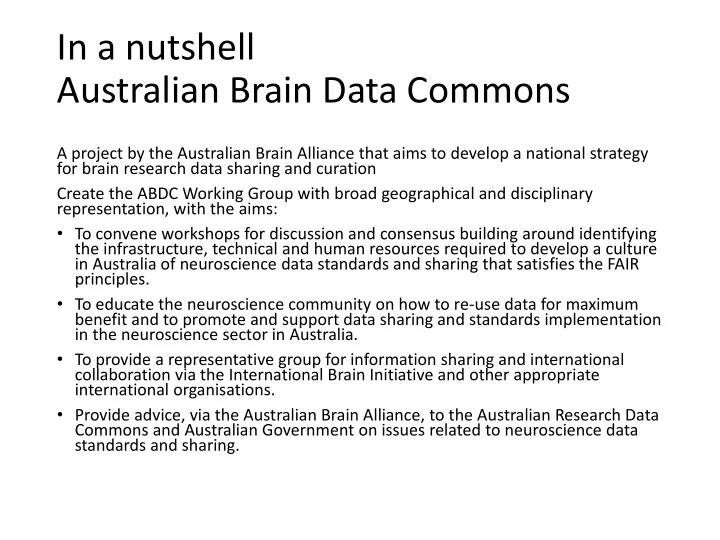

In a nutshell Australian Brain Data Commons A project by the Australian Brain Alliance that aims to develop a national strategy for brain research data sharing and curation Create the ABDC Working Group with broad geographical and disciplinary representation, with the aims: • To convene workshops for discussion and consensus building around identifying the infrastructure, technical and human resources required to develop a culture in Australia of neuroscience data standards and sharing that satisfies the FAIR principles. • To educate the neuroscience community on how to re-use data for maximum benefit and to promote and support data sharing and standards implementation in the neuroscience sector in Australia. • To provide a representative group for information sharing and international collaboration via the International Brain Initiative and other appropriate international organisations. • Provide advice, via the Australian Brain Alliance, to the Australian Research Data Commons and Australian Government on issues related to neuroscience data standards and sharing.
Key Is Issues Broad spectrum of methods and data across neuroscience subdisciplines • Cognitive neuroscience & Psychology, functional imaging (fMRI, EEG, MEG) • Animal behaviour/Neuroethology data • MRI/PET/Molecular imaging (human and animal) & brain atlases • Microscopy • Molecular neuroscience • Electrophysiology and calcium imaging • Neurogenomics and clinical data • Computational neuroscience, AI/Machine Learning No clear standards within or across subdisciplines • Dependent on data acquisition equipment & software • Sharing often ad hoc, using variety of means (from USB sticks to cloud storage) Barriers (real and ”perceived”) • Lack of appropriate sharing solutions (varies by discipline) • Too difficult/technical and no resources (varies by discipline) • Legal & Ethical concerns, international data transfer, clinical data privacy • Concerns about data ownership, “being scooped”, assignment of credit, “parasites” • Industry: lack of preparedness by academics & institutions.
Lessons Learnt Open solutions exist overseas, vary in scope, can be adapted/extended • CONP: Canadian Open Neuroscience Platform • Training, international partnerships, ethics & data governance, communications, analysis, interoperability, scalability & CBRAIN (compute) • GA4GH: Global Alliance for Genomics and Health • Governance, technical, legal, ethical, data privacy • BIDS: Brain Imaging Data Structure • Simple structured file system for imaging data & metadata • Extendable with open community governance Software platforms largely exist but not always user friendly or adapted to different types of data. Resourcing needed to: • Make technology/informatics/platforms for sharing EASY • Assemble data and meta data in standard formats & submit/upload Provide incentives for adoption • powerful & easy compute/analysis (e.g. CBRAIN, BIDS-Apps) • Scientific Data publication: high quality dataset journals National level but open/distributed governance of standards development and maintenance needed, in collaboration with international initiatives
Acknowledgements ABDC Working Group Invited Workshop Experts Tony Hannan Amy Brodtmann Alan Evans Tom Johnstone Jake Carroll David Orloff Gary Egan Khaled Chakli Clare Bown Lindy Fitzgerald Wojtek Goscinski Paula Andrea Martinez Geoff Goodhill Glenda Halliday Jason Swedlow Sarah Medland Glenn Papworth Kaylene Simpson Frederic Meunier Linda Richards Rosie Hicks Lucy Palmer Andre van Schaik Greg Faber Laura Poole-Warren Hsin-Hao Yu All participants at the Data sharing: neuroscience, microscopy and experiments symposium in Australian Research Data Commons Canberra Australian Brain Alliance & AAS International Brain Initiative
Recommend
More recommend